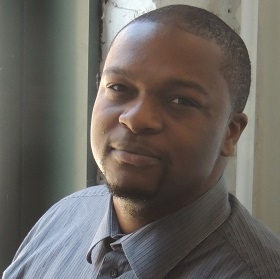 Guest blogger Vernon L. Johnson, MPH, is Youth Initiatives Coordinator for the Illinois African American Coalition for Prevention, where he oversees and implements programs that advance positive youth development, violence prevention, sexual assault awareness, environmental justice, sexual health, and social justice. Next week, he will guest-present for the Southside Youth Peace and Leadership Council, a violence prevention program of the Adler School Institute on Public Safety and Social Justice (IPSSJ), the School’s Department of Art Therapy, and Precious Blood Ministry of Reconciliation . He also recently took part in peace circle training through the IPSSJ–and guest-blogs today implementing peace circles and restorative justice practice.
Guest blogger Vernon L. Johnson, MPH, is Youth Initiatives Coordinator for the Illinois African American Coalition for Prevention, where he oversees and implements programs that advance positive youth development, violence prevention, sexual assault awareness, environmental justice, sexual health, and social justice. Next week, he will guest-present for the Southside Youth Peace and Leadership Council, a violence prevention program of the Adler School Institute on Public Safety and Social Justice (IPSSJ), the School’s Department of Art Therapy, and Precious Blood Ministry of Reconciliation . He also recently took part in peace circle training through the IPSSJ–and guest-blogs today implementing peace circles and restorative justice practice.
My name is Vernon Lloyd Johnson, and I am many things. I am a violence prevention advocate and practitioner, a youth initiatives coordinator, and, as I like to put it, an interdependent ally.
When I was 11 years old, I was robbed and assaulted. It took me awhile to adjust to my surroundings, and to trust the communities I stepped into. I soon realized that being an advocate in Chicago’s violence prevention movement requires me to put it all on the line, and that includes my life, my dedication, words, and attitude. I am okay with that.
The eloquent words of Dr. Elena Quintana [IPSSJ Executive Director at the Adler School] brought it home for me at a Strengthening Chicago’s Youth meeting. She essentially said, “We cannot be afraid to serve people who need resources.” I cannot be afraid or scared of the very people I intend to help. I cannot have prejudices or stereotypes to influence how I view people. There is a totality of positive perception that is unmasked by our genuine effort that creates an instant feeling of being valued by the people we help. This is the essence of being an interdependent ally, and this is at the heart of social justice. Other people’s struggles is intertwined to your own oppressions, and in unison, you embrace and support one another.
I recently held peace circles for elementary girls on the west side of Chicago through Chicago Communities in Schools. It is exciting to see more and more schools and organizations vested in restorative justice techniques and practices. There are so many trauma-informed situations, environmental, and societal issues that restrain Chicago youth from reaching their potential. I call it ecological oppression. There is oppression at a multitude of levels that creates a negative and lasting perception that these young people begin to internalize. Those young girls have already seen many forms of interpersonal violence, bullying, loss of loved ones to violence, jail, or due to health-related ailments. They suffer the brunt of emotional, psychological and physical abuse from those who have issues that they wrongly displace upon them. Communities are ravaged by poverty, health disparities, and other issues.
All of this is taken in by 10- or 11-year old girls. It was tough at first to encourage their vulnerability, due to desensitization as a result of poly-victimizing experiences. Their vulnerability only came through my self-imposed vulnerability, through my caring expressions, creating a consensual safe environment, and using my black body to shatter the negative internalized projection of black men in their communities.
Amidst all of this, these young girls were able to tell me their stories. I told them that I saw them as royalty for having the bravery to share their experiences. Their puffy wet eyes looked up with a spark of surprise and an awkward feeling of happiness and peace they did not foresee.
By the end of our circles, they did not see it as an end, but a new beginning. I told them that they can be the circle keepers now, and continue to help themselves and all the people in their life they care about. It was a moment of excitement, but more importantly, it was a moment of hope. There has to be a reclaim on hope and value of life for our young people. The human spirit is an unbeatable variable. That ideology has to filtrate from the individual, to the community, and to the policies that effect people so that we may see the positive social change we all yearn for in the great city of Chicago and beyond.
Learn more: “Restorative Justice: A Primer and Exploration of Practice Across Two North American Cities” is a primer and tool for practitioners, researchers, advocates, lawmakers, lay people and justice professionals, developed by the Adler School Institute on Public Safety and Social Justice, in collaboration with the Adler School Vancouver Campus and the Illinois Balanced and Restorative Justice Project. For more information on resources and upcoming events, email IPSSJ@adler.edu.